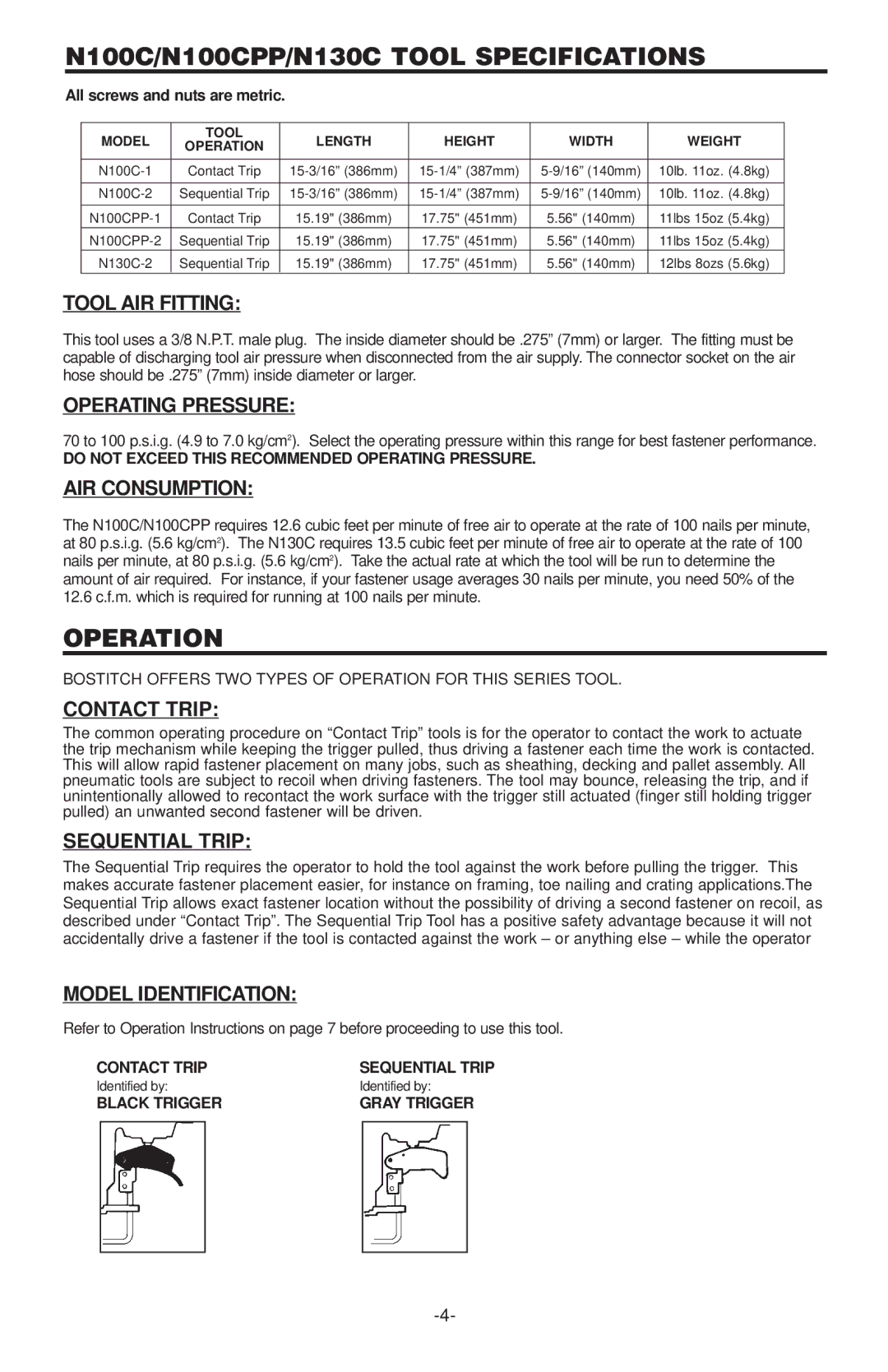
N100C/N100CPP/N130C TOOL SPECIFICATIONS
All screws and nuts are metric.
MODEL | TOOL | LENGTH | HEIGHT | WIDTH | WEIGHT | |
OPERATION | ||||||
|
|
|
|
| ||
|
|
|
|
|
| |
Contact Trip | 10lb. 11oz. (4.8kg) | |||||
|
|
|
|
|
| |
Sequential Trip | 10lb. 11oz. (4.8kg) | |||||
|
|
|
|
|
| |
Contact Trip | 15.19" (386mm) | 17.75" (451mm) | 5.56" (140mm) | 11lbs 15oz (5.4kg) | ||
Sequential Trip | 15.19" (386mm) | 17.75" (451mm) | 5.56" (140mm) | 11lbs 15oz (5.4kg) | ||
Sequential Trip | 15.19" (386mm) | 17.75" (451mm) | 5.56" (140mm) | 12lbs 8ozs (5.6kg) |
TOOL AIR FITTING:
This tool uses a 3/8 N.P.T. male plug. The inside diameter should be .275” (7mm) or larger. The fitting must be capable of discharging tool air pressure when disconnected from the air supply. The connector socket on the air hose should be .275” (7mm) inside diameter or larger.
OPERATING PRESSURE:
70 to 100 p.s.i.g. (4.9 to 7.0 kg/cm2). Select the operating pressure within this range for best fastener performance.
DO NOT EXCEED THIS RECOMMENDED OPERATING PRESSURE.
AIR CONSUMPTION:
The N100C/N100CPP requires 12.6 cubic feet per minute of free air to operate at the rate of 100 nails per minute, at 80 p.s.i.g. (5.6 kg/cm2). The N130C requires 13.5 cubic feet per minute of free air to operate at the rate of 100 nails per minute, at 80 p.s.i.g. (5.6 kg/cm2). Take the actual rate at which the tool will be run to determine the amount of air required. For instance, if your fastener usage averages 30 nails per minute, you need 50% of the 12.6 c.f.m. which is required for running at 100 nails per minute.
OPERATION
BOSTITCH OFFERS TWO TYPES OF OPERATION FOR THIS SERIES TOOL.
CONTACT TRIP:
The common operating procedure on “Contact Trip” tools is for the operator to contact the work to actuate the trip mechanism while keeping the trigger pulled, thus driving a fastener each time the work is contacted. This will allow rapid fastener placement on many jobs, such as sheathing, decking and pallet assembly. All pneumatic tools are subject to recoil when driving fasteners. The tool may bounce, releasing the trip, and if unintentionally allowed to recontact the work surface with the trigger still actuated (finger still holding trigger pulled) an unwanted second fastener will be driven.
SEQUENTIAL TRIP:
The Sequential Trip requires the operator to hold the tool against the work before pulling the trigger. This makes accurate fastener placement easier, for instance on framing, toe nailing and crating applications.The Sequential Trip allows exact fastener location without the possibility of driving a second fastener on recoil, as described under “Contact Trip”. The Sequential Trip Tool has a positive safety advantage because it will not accidentally drive a fastener if the tool is contacted against the work – or anything else – while the operator
MODEL IDENTIFICATION:
Refer to Operation Instructions on page 7 before proceeding to use this tool.
CONTACT TRIP | SEQUENTIAL TRIP | ||||
Identified by: | Identified by: | ||||
BLACK TRIGGER | GRAY TRIGGER | ||||
|
|
|
|
|
|
|
|
|
|
|
|
